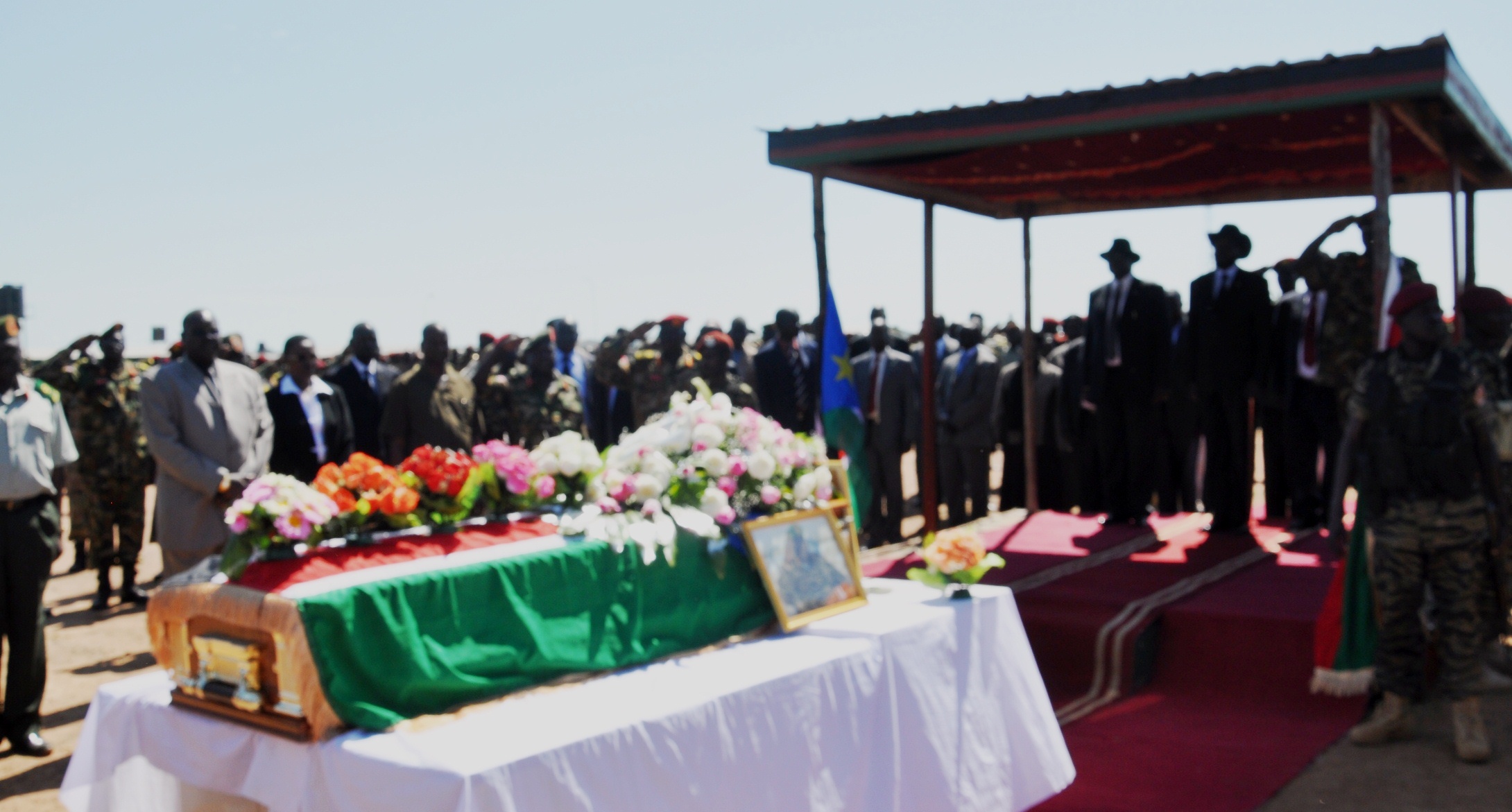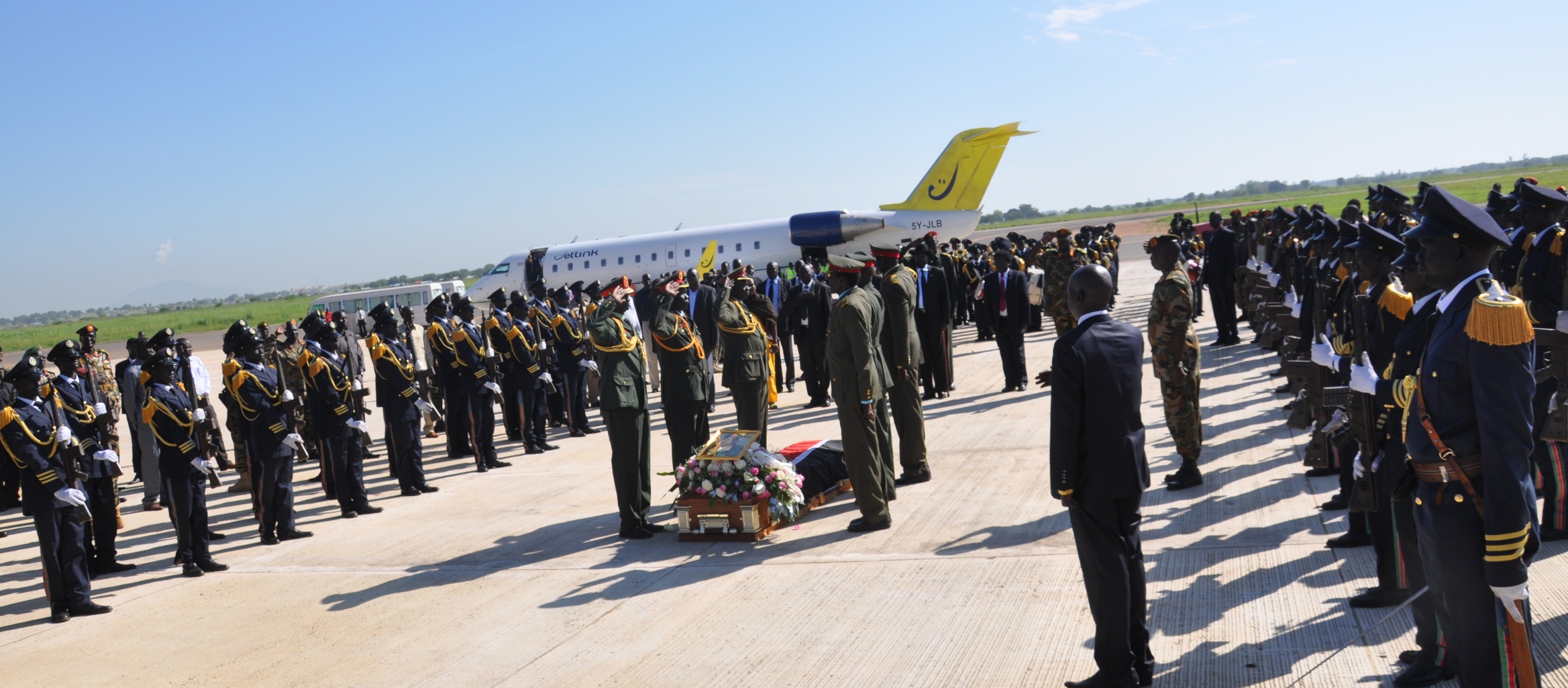South Sudan lays to rest top SPLA General Paulino Matip
August 24, 2012 (JUBA/BENTIU) – The body of the deputy commander-in-chief of the South Sudan army, General Paulino Matip Nhial, who died in the early hours of Wednesday 22 August in Nairobi, Kenya was buried in his home county of Mayom in Unity State on Friday.

Matip’s relatives confirmed that he died at 1.00 am local time in Mayo Clinic having long suffered from diabetes and high blood pressure. His coffin was met at Juba International Airport on Friday, by thousands of mourners, Army Generals, Ministers and Members of Parliament.
Senior figures, including President Salva Kiir and his deputy Riek Machar accompanied Matip’s body to the general headquarters of the South Sudanese army (SPLA) in Bilpam where the military’s top generals had the chance to pay their last respects.
KIIR’S TRIBUTE
Speaking at the army headquarters Kiir said the late General had unified South Sudan’s armed groups. After the 2005 Comprehensive Peace Agreement between Kiir’s SPLA and the Khartoum government, which ended decades of civil war, Matip was the first leader of one of South Sudan’s other armed group to integrate his forces into the SPLA, which, under the CPA, had become the country’s official military.

As part of the landmark 2006 Juba Agreement between the SPLA and Matip’s Sudan Sudan Defence Forces (SSDF) he assumed the second highest position in the South Sudanese Army (SPLA), only behind President Salva Kiir Mayardit, the country’s Commander-in-Chief.
Being appointed to such a high position was in recognition of Matip’s stature, commanding a force of around 50,000 men. Despite the SSDF receiving assistance from Khartoum as part of regimes divide and rule tactics, exploiting ethnic divisions in during the two-decade conflict, many feel that his lasting legacy was that he unified the two largest armed groups in South Sudan, and consequently severely weakened Khartoum’s control of the region.
In 2011 as part of the CPA South Sudan voted to secede from Sudan becoming the world’s newest nations and – considering its underdevelopment, proliferation of arms and tense relations with its northern neighbour – also one the world’s most fragile.
Unlike some other South Sudanese generals, such as the late General George Athor, and Matip’s long time deputy Peter Gadet, Matip did not rebel against the nascent government in Juba at any point after he joined the SPLA in 2006.
Athor began a rebellion after he failed to become Jonglei State governor in 2010 and was killed by the SPLA in late 2011. Gadet launched his own rebellion in April 2011 but rejoined the government in August the same year, but failed to convince all of those under his command to rejoin the SPLA.
These instances have reinforced the view held by some analysts that the SPLA has a long way to go to transform itself from a patchwork of self-interested militia’s into a professional, responsible and truly national army. Indeed Matip’s death led Sara Pantuliano, Head of the Humanitarian Policy Group (HPG) at the Overseas Development Institute and Sudan expert, to ask “Who will his troops be loyal to?” in a comment on the social networking site twitter, responding to the first reports of Matip’s death on Wednesday.
MATIP COMES TO REST IN MAYOM
After a brief prayer ceremony at Matip’s house in Juba, organised by President Kiir, Matip’s coffin was flown to Mayom County, accompanied by Vice President Machar, Deputy Defence Minister, Majak Degout, as well as a number of senior high ranking SPLA officers.
Machar, who also hails from Unity State, which lies on the new international border with Sudan, urged the people of Unity State and Matip’s family to be calm despite the death of their son, adding that “we need to strengthen ourselves for the loss”.
“It is God given and has return back his soul from us”, added Machar.
On Friday the Unity State government announced over state radio that a three day period of mourning would last until August 27 when all state employees would be asked to resume their normal duties.
Peter Dak Khan, an MP representing Mayom at the Unity State Legislative Assembly in Bentiu, told Sudan Tribune, the Matip’s death had been a sad day for South Sudan, particularly the Bul-Nuer clan. Matip had shown he was a man of peace over the last seven years, since he reunited his forces with the SPLA. For much of that period Matip was believed to be seriously ill and over the years there have been numerous rumours of his death.
However, Khan said that his death had come as a surprise to the people of South Sudan, despite his age and his well known health issues. Khan added that people of South Sudan will miss a man with a strong heart. Many Mayom citizens appeared visibly moved during the burial which was held in Mayom at the request of Matip’s family.
The local MP called on the Mayom community and all South Sudanese citizens to relieve the pain of loosing such an important man by re-energizing efforts to develop the young nation, which has some of the worst development indicators in the world.
Unresolved issues with neighbouring Sudan, and internal problems such as corruption inefficient institutions and insecurity have hampered the governments efforts to help the nation recover from the civil war, which devastated the region.
MAYOM REBELLIONS
Since April 2011, just months before South Sudan’s independence, Mayom County has been the base of a rebellion against the Juba government known as the South Sudan Liberation Movement/Army (SSLM/SSLA). The rebel group was launched by Major General Peter Gadet Yak, who had served under Matip in the SSDF before the 2006 Juba Agreement with the SPLA.
According the Small Arms Survey research group, Gadet had “a leading role in the South Sudan Unity Movement/Army (SSUM/A), a militia founded and led by Paulino Matiep in Bentiu that merged with the Khartoum-supported South Sudan Defense Forces (SSDF) following the Khartoum Peace Agreement of 1997.”
In his “Mayom Declaration” Gadet described the Juba government, which is dominated by the SPLA’s political wing the SPLM, as a group of “corrupt gangs”. Citing corruption and tribalism, especially against the Nuer tribe, he called for ‘national broad-based government agreed upon by all the South Sudan political parties.’
Considering Gadet and Matip’s previous ties with Khartoum – when the CPA was signed in January 2005 Matip, Gadet, and a large number of their forces were based on the outskirts of Khartoum – and the location of Mayom on the border of Sudan’s South Kordofan State, inevitably Southern officials were quick to accuse the Khartoum government of supporting the SSLA in a bid to destabilise oil-rich Unity State ahead of independence.
Sudan lost 75% of the country’s oil-production when South Sudan seceded.
South Sudanese officials have alleged that Gadet’s Mayom Declaration was in fact drafted in Khartoum with the help of the Sudan Armed Forces (SAF). Khartoum denies backing the SSLA or any other rebel military group in South Sudan.
In April 2012 the Geneva-based Small Arms Survey reported that Sudan and Eritrea were the “likely source” of arms seized from militia groups, such as Gadet’s SSLA.
Evidence from interviews conducted and rifles seized from rebels of Athor’s South Sudan Democratic Movement (SSDM) and Gadet’s South Sudan Liberation Army (SSLA) in Jonglei, Upper Nile and Unity states matched those in the hands of SAF, the Survey claimed.
The SSLA continues to deny claims it is supported by Khartoum, as does the Sudanese government, which is keen to emphasise Juba’s alleged backing of rebels groups in it’s Darfur, South Kordofan, and Blue Nile territories.
Gadet’s involvement in the SSLA rebellion lasted only five months, as he rejoined the SPLA in August 2011 shortly after South Sudan’s independence but the insurrection has caused significant political and social upheaval and continued insecurity, especially in Mayom County.
In June last year the County’s Commissioner, Charles Machieng Kuol, was sacked after he refused to apologise for telling Sudan Tribune in May 2011 that the SPLA had burnt down 7,800 homes while pursuing the SSLA.
The SPLA disputed the figure and said that any damage was inadvertently caused while engaging with the militia group. Governor Taban Deng Gai replaced Machieng with his son-in-law John Madeng Gatduel on 7 March 2011. The Bull Nuer community of Mayom County, from which the late Matip hails, criticised the appointment complaining that they had not been consulted.
(ST)

